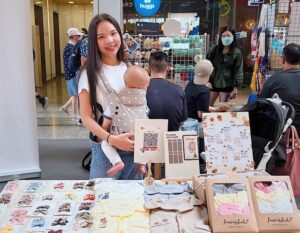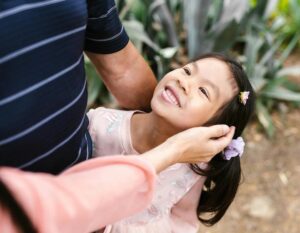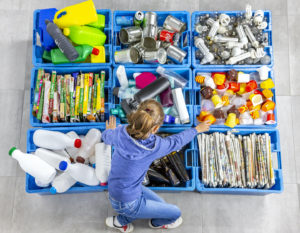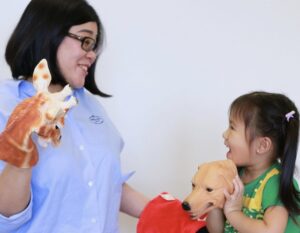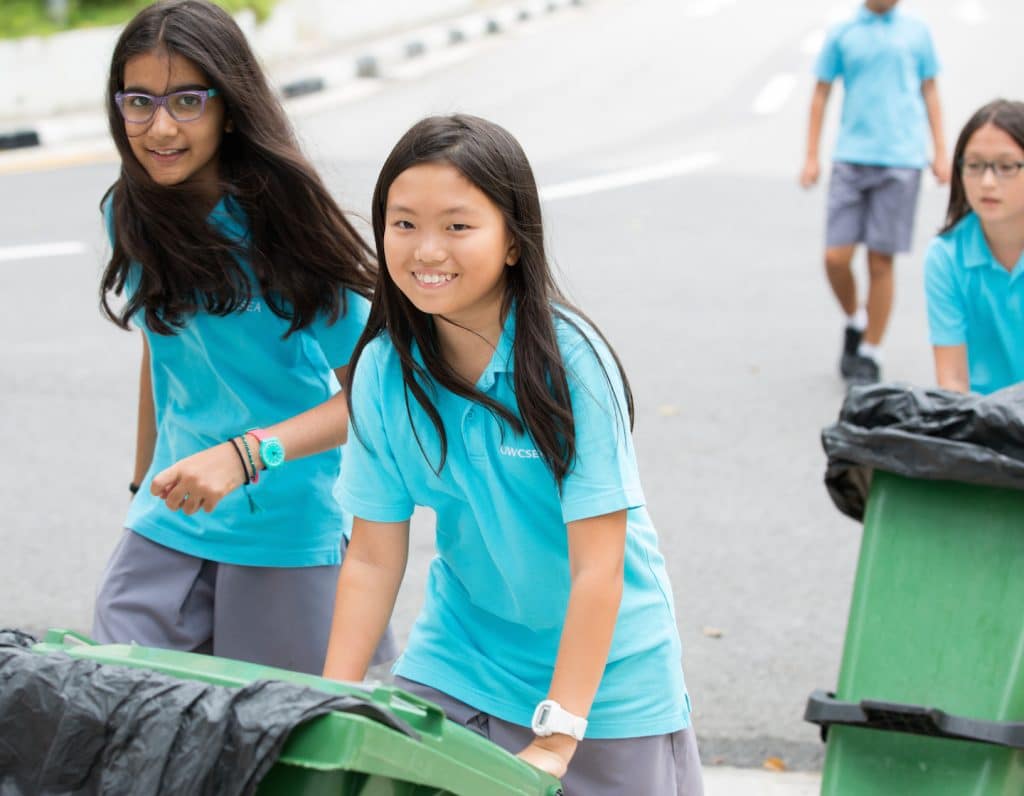

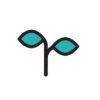


It ain’t easy being green… but it’s vital for the preservation of our planet! Here are the most green schools in Singapore that are raising a new generation of environmentalists
What does it mean to be green? That you love and respect the environment? That you make an effort to be 100% organic? Do you endeavour to cut down on waste or make your own cleaning products free of nasties?
With everything from cars to office buildings trying to go as green as possible, it’s a no-brainer that schools would follow suit. If you care about the future of the planet, mama, teaching your kids how to live a green lifestyle is a great place to start.
We couldn’t cover every school in Singapore making green initiatives, but to see if your local school is making strides, check out the School Green Awards run by the Singapore Environment Council. The “Daisy” category is just for preschools; the “Lotus” award is for schools who have showcased at least one environmental project, and participated in an extra external activity to promote Singapore’s sustainability. Parents with littlies should also check out Kindred Garden, which teaches kids about recycling and upcycling in a fun and interactive way. Local preschools PCF Sparkletots, Global Tots and Agape Little Uni have all spearheaded additional workshops and carnivals, too!
Below, check out our roundup of green schools that walk the walk in teaching kiddos important lessons about sustainability and the environment.
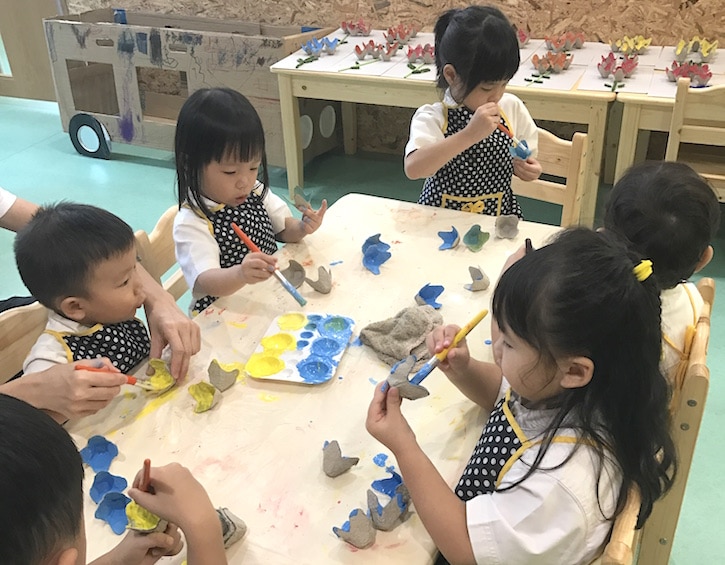

Mahota Preschool
Curriculum: Mahota’s nature-based curriculum is all about empowering children with engaging lessons and meaningful activities to “rewild” their hearts. Kiddos take a weekly nature walk to experience and understand how nature sustains life. Further “eco-literacy” initiatives include indoor farming, sorting recyclable materials, and making crafts with recycled materials.
And Mahota doesn’t just recycle, it also upcycles, reusing materials for craft projects and decorations, and encouraging students to have reusable lunchboxes rather than plastic bags. At meals (made with organic ingredients and incorporating biodegradable utensils), teachers emphasise the importance of finishing food to avoid food wastage. Children also learn important habits like conserving water, using a single paper towel to dry their hands, and turning off the lights to reduce energy consumption.
Parental Involvement: In 2018 the school will host a “Clean the Beach” event for students and their families. In addition, families are always welcome to donate recyclable materials for use with various projects.
Awards/Recognition: In November 2017, Mahota Preschool won the “Daisy Award” at the SEC-Starhub School Green Awards in recognition of its conservation efforts and dedication to the environment!
Mahota Preschool, 808 French Road #03-01 Kitchener Complex Singapore 200808, [email protected], Tel: (+65) 6291 1915, mahotaeducation.sg
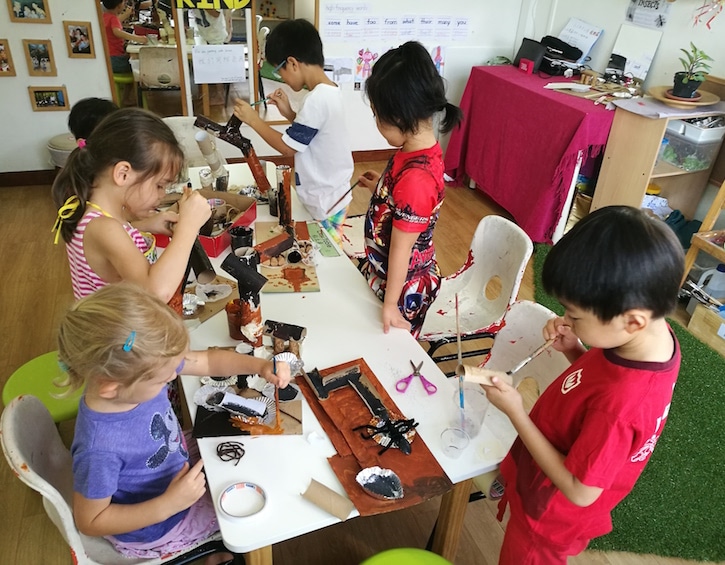

Between Two Trees
Curriculum: This lovely Reggio-inspired school is all about reuse and upcycling, from making crafts with recyclables, to re-using bottles for things like soap dispensers, to using school plates and utensils rather than disposable ones during birthday celebrations.
Parents rave about B2T’s edible garden curriculum, in which students actually have the opportunity to eat what they grow in the school’s own garden. The school chef is also dedicated to composting kitchen food waste, which the children in turn use for fertilising their gardens. Kids have also learned how to separate their waste during mealtimes. Students have even spent days without air conditioners to learn important lessons about energy consumption.
Earth Day is regularly celebrated at B2T, with discussions and hands-on events meant to expand children’s knowledge of the environment and how to be more green.
Parental Involvement: Families are encouraged to avoid using plastic bags (or to reuse them in instances like disposing of diapers), and the school regularly organises recyclable collection drives to replenish its arts & crafts supplies. A recent Earth Day celebration entailed Nursery and Kindergarten students spending the day with parents and caregivers to clean up a beach at East Coast Park.
Awards/Recognition: Between Two Trees is a regular participant in the annual Green School Awards organised by the Singapore Environmental Council, and was won the Daisy Award three years running for its green efforts!
Between Two Trees, 7 Ming Teck Park, Singapore 277375, [email protected], Tel: (+65) 6733 9768, www.betweentwotrees.sg
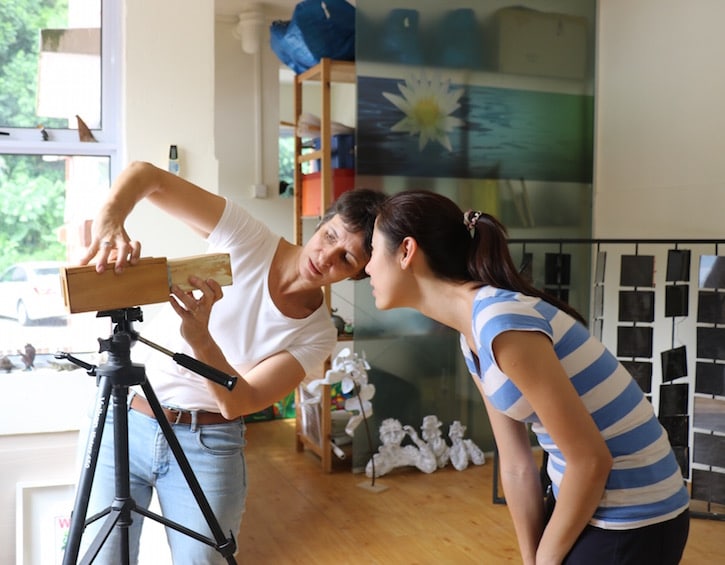

Blue House Nursery & International Preschool
Curriculum: Blue House is famed for its Reggio Emilia approach, which in itself takes the very green outlook that children are inspired by the sights, sounds, scents, tastes and texures of the natural environment around them. Along these lines, Blue House children are encouraged to see everyday objects as valuable and purposeful; recycled objects like boxes, bottles, cardboard, paper, bottlecaps, fabrics and even electronics are incorporated into projects that engage children’s creative thinking, imagination and problem solving.
Blue House’s teaching practice actually recognises the environment as a child’s third teacher; children engage on a daily basis with natural materials, seeing how things grow, observing animals in their natural environment, and actively asking questions about how it all works.
Parental Involvement: Blue House just might be the only school in Singapore that has its own Recycling Atelier (appropriately adjacent to its Art Atelier), where students, families, staff and partner organisations can recycle and donate everyday materials to the school. For example, Blue House partners with IKEA to source its leftover palettes, which have been used in many furniture projects.
Recycling is truly at the heart of the Blue House philosophy; the school doesn’t print marketing materials, and the on-site Pantry café for parents regularly recycles wastage, to the point that you’ll often see coffee grounds and orange peels incorporated into cooking role playing in the Nursery building.
“Going green is not just about recycling,” the school says. “It’s about supporting children holistically in gaining an understanding of the world being a precious and wondrous place, and of the people, resources, objects and materials that both it and we provide having significant value.”
Blue House Nursery & International Preschool, 2 Turf Club Road, Singapore 287988, [email protected], Tel: (+65) 6734 0824, www.bluehouseinternational.com
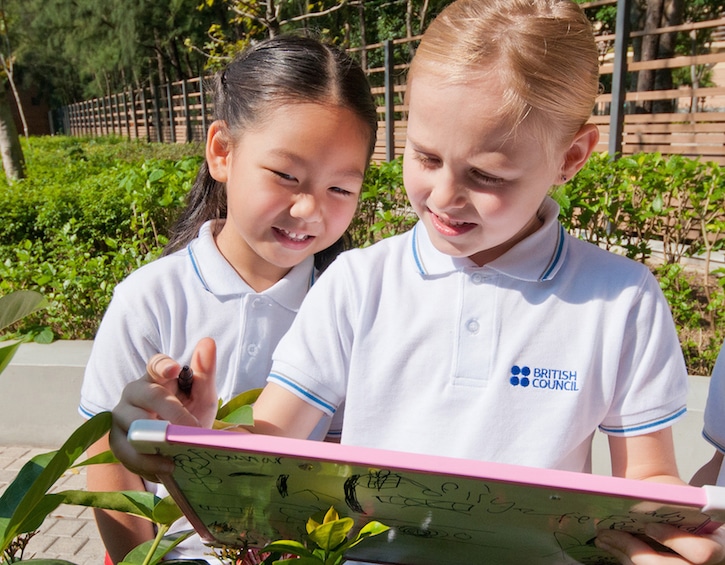
British Council Pre-school
Curriculum: “Going green” is an integral part of daily life at British Council Pre-school: children learn how to sort and recycle, to turn off the lights whenever they leave the classroom, and to save water when washing their hands. Paper and plastic bags are also recycled; recycled materials like bottle caps are utilised in arts & crafts activities; and teachers keep printing to a minmium.
What’s more, Nursery and Kindergarten students have a shared responsibility to tend to the school’s garden corner, doing everything from planting, to maintenance, to cleaning up the area.
Each April, British Council Pre-school celebrates “Green Week” in conjunction with Earth Day. Besides environment-focused discussions and classroom activities, students venture on informative field trips to spots like the NEWater plant (to learn about recycling water) and to Gardens by the Bay (to learn about plant species)
Parental Involvement: Parents are of course encouraged to donate recyclables for arts and crafts projects. Furthermore, in preparation for the annual concert, parents are invited to create props and costumes out of recycled materials with their children. Communication is also kept mostly online to reduce paper waste.
Awards/Recognition: British Council Pre-school is located in the very first CarbonNeutral® development in all of Asia Pacific – Tampines Concourse – meaning the building has a net zero level of greenhouse gas emissions. The school has also won the BCA Green Mark Certified Award in recognition of its efforts to promote sustainable operations and leave a positive impact on the environment.
British Council Pre-school, 11 Tampines Concourse, #01-02/03/04, Singapore 528729, Tel: (+65) 6807 1573, www.britishcouncil.sg/pre-school
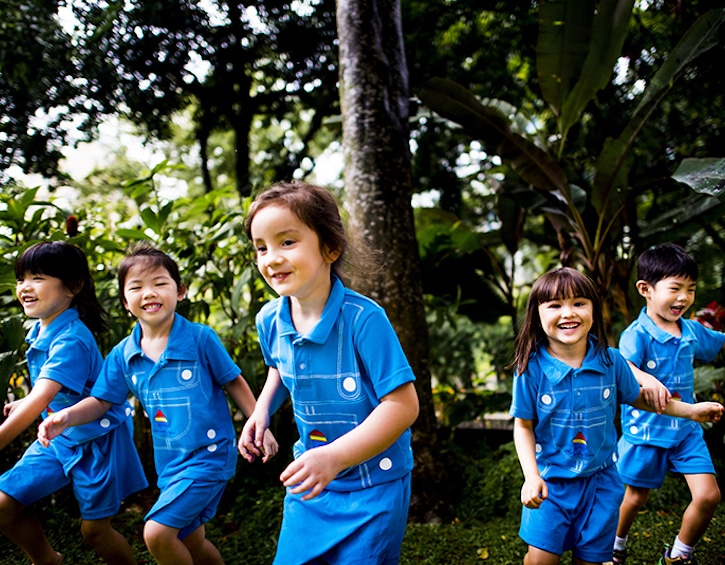

Children’s Cove
Curriculum: Children’s Cove has been eco-conscious from the start: it was designed with energy-saving aircon units and a multitude of fans to help manage air flow. The school also features LED lights to go along with large windows that optimise daytime lighting.
Every day, teachers bring the children outdoors – and of course they make sure to turn off the lights when they leave the classroom. Children also discuss current issues like climate change – they recently brainstormed what might have triggered flash floods in Singapore – and are empowered to create their own rules to be “eco-guardians.” Each and every classroom features a “blue bin” where students can do their own recycling.
Parental Involvement: Given that the “3Rs” are woven into the curriculum, parents are always invited to donate reusable materials like plastic and glass bottles, carton boxes and bottlecaps for various arts and crafts activities. Children’s Cove parents also helped to build a lovely sound garden out of old pots, pans and utensils.
Children’s Cove, 58 Jalan Penjara, Singapore 149382 and 30 Orange Grove Road, #08-01, Singapore 258352
[email protected], Tel: (+65) 6655 0077, www.childrenscove.sg
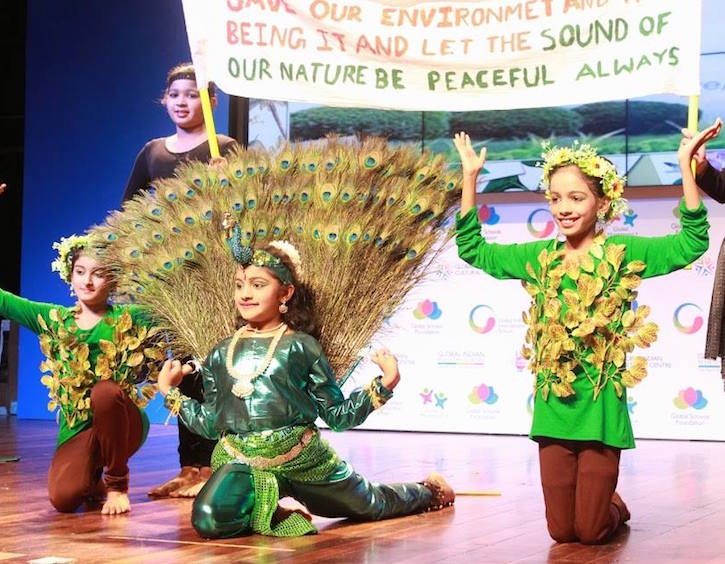

Global Indian International School
Curriculum: Green living is truly a way of life at GIIS, not just a part of the curriculum. The first working day of every month is marked as an “energy saving day”, with all lights switched off for a full hour. Students in the Eco-club also focus on reducing waste and encouraging food conservation and composting throughout the school.
At the kindergarten and primary levels, students study topics like global warming, energy conservation, waste management, food waste, composting, and much more. GIIS students also maintain an organic fruit and vegetable garden; they even have a co-op club to sell the produce. At periodic special assemblies, “Energy Monitor” badges are handed out for students to remind both themselves and their families about the importance of being green.
Students regularly make art of recycled materials, as they do with the popular “Trash to Fashion” event. They also visit local kindergartens, in conjunction with TetraPak’s recycling programme, to teach children the importance of recycling (and show them just how to do it). To date GIIS students have recycled over 5,000 pieces of TetraPak materials as part of this project! The school also partners with Food Bank Singapore and has adopted Whampoa Canal in other community outreach projects.
Earth Day and World Water Week are both major events at GIIS. For the former, students received “Grow Kits” so they could grow their own indoor plants at home. The latter entailed everything from dress-up costumes to a specially created “Adventures of Water Wally” comic strip.
Parental Involvement: At the World Water Week special assembly, parents participated with talks, songs and even dances demonstrating the importance of water. There’s also the Mom@School initiative, which encourages parents to engage with kids on a monthly basis on a green-themed project of their choosing.
Awards/Honors: GIIS has received a plethora of accolades from the Singapore Environmental Council to celebrate its students’ green attitude and actions. The school was also invited to attend the Public Hygiene Council’s “Clean and Green Carnival”, which was launched by Prime Minister Lee Hsien Loong himself.
Global Indian International School, Click here to see all four locations, admission.sg@globalindianschoo
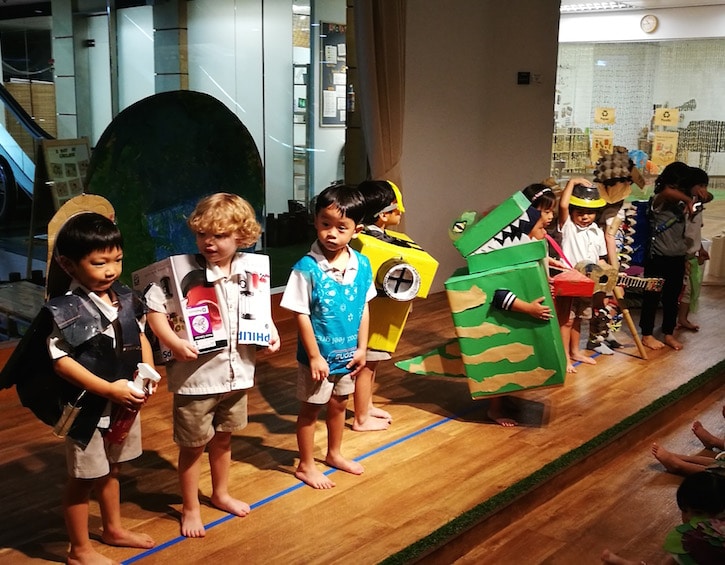

LeClare Preschool
Curriculum: Recycling is strongly encouraged at LeClare, whether in the “Recycling Corner” where parents are asked to drop off recylables, or with the crafts projects students work on for their Earth Day costumes. Students come to see the creative potential in everyday discarded materials, providing new opportunities for both creativity and communication.
LeClare’s curriculum seamlessly integrates the environment into all classes, whether students are learning about “Air & Water” in Nursery1; examining “Plants & Animals” and questioning why they grow in Nursery 2; or studying Climate Change and consumption patterns in Kindergarten.
Students are empowered to take personal responsibility for conserving water, using minimal paper to dry their hands, and turning off lights in the classroom. They are all also involved in caring for the school’s garden, from watering it and plucking weeds to looking up recipes that utilise the ingredients! Lucky LeClare kids enjoy the fruits of their labor on a daily basis, with their harvested lemons, chili, mint and rosemary all incorporated into their healthy and nutritious meals!
Parental Involvement: Parents are not only encouraged to drop off recyclables for use with craft projects, but they also help design the students’ Earth Day costumes using recycled materials.
LeClare Preschool, 100 Beach Road, Shaw Tower, #02-07 Singapore 189702, [email protected], Tel: (+65) 6969 9479/8388 7377, www.leclare.edu.sg
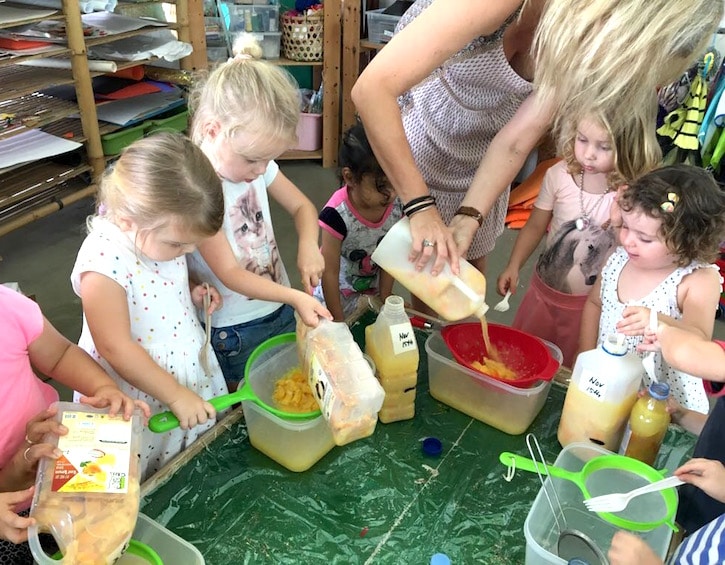
Little Bunnies (The Outdoor Classroom)
Curriculum: The name says it all! Little Bunnies (the Outdoor Classroom) is green through and through: Housed in one of the greenest buildings in Singapore (Infinite Studios), the school doesn’t use aircon and has an ‘open classroom’ concept with a façade constructed from recycled items and green wall panels. Even the furniture is made from fully sustainable bamboo from Bali, while tables are made from reclaimed wood from India.
What’s more, the school uses a totally organic cleaning product (made by the children!) to clean floors, windows, hands and dishes. The key ingredients? Orange peel and brown sugar (yum!).
Daily lesson plans bring the natural world and the environment into the classroom, from discussing the weather and its effect on nature, to reminding children to turn off the taps when they was their hands. The school uses recycled materials for most of its arts and crafts projects, too! And of course all the Little Bunnies play a role in growing and nurturing plants.
Parental Involvement: As at many other schools, Little Bunnies encourages parental involvement through the donation of recycled boxes and bottles for various craft projects. Parents also get involved in various green charity projects that the school coordinates.
Little Bunnies (The Outdoor Classroom), 01/08, Infinite Studios, 21 Media Circle, Singapore 138562, [email protected], Tel: (+65) 9773 3022/9759 8990, www.facebook.com/bunniesoutdoorclassroom
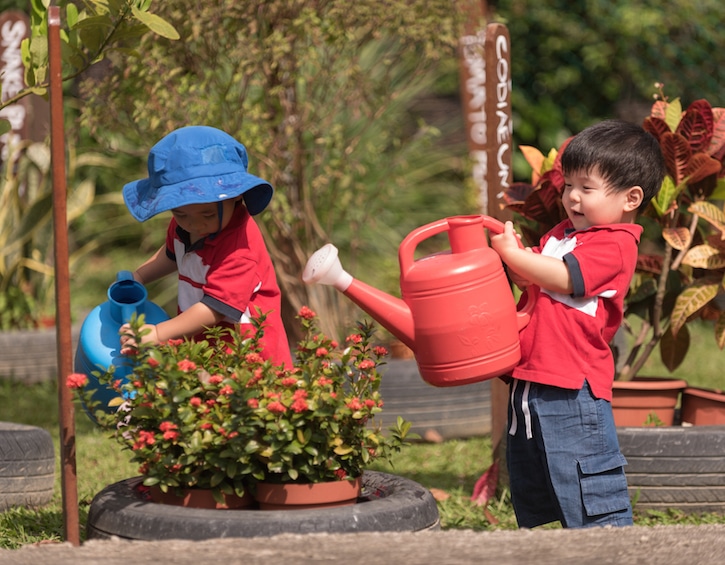

Little Paddington Preschool
Curriculum: From the moment Little Paddington’s leadership sat down to plan the school environment, there’s been a focus on the efficient and responsible use of resources, from maximising lighting and airflow, to minimising the school’s carbon footprint.
A green mindset is an integral part of the daily curriculum: students have a keen awareness of what is happening to the Earth (and their own ownership and stewardship in making it a better place). They also gain understanding of deforestation and waste, recognise the “3 Rs” symbol, and learn how to recycle and upcycle paper and other products into their daily work and crafts projects. Last Christmas Little Paddington students made sure to wrap presents with newspaper!
The school is also an active participant in Singapore’s Little Green Dots Program, where professionals and industry specialists speak to the children about green initiatives.
Parental Involvement: Understanding that a truly green lifestyle needs to live at home with the students, too, Little Paddington frequently involves parents in a variety of projects and collaborations, including a “cleanliness drive” where everyone got together to clean up the community garden, and an “Energy Conservation” initiative where parents and students worked together to develop new ideas for conserving energy both at home and at school.
Little Paddington, Bukit Timah: 236 Turf Club Road, Singapore 287985, Tel: (+65) 9649 5801 and Hougang/Kovan: 4 Jalan Tani, Singapore 548542, Tel: (+65) 6280 3007, www.littlepaddington.com
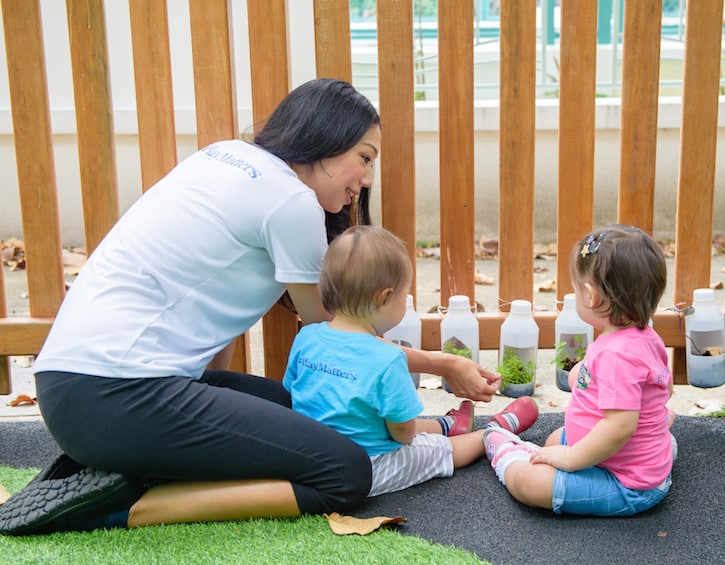

Curriculum: Little Tykes is a new Reggio Emilia-inspired boutique preschool in Clementi where you’re never too young to learn how to “Go Green!” Little Tykes takes steps to encourage a sense of care and understanding of the environment; for instance, the thriving mini-herb bottle garden where little ones can nurture and grow edible herb plants under the guidance of their knowledgeable teachers.
In fact, an expert horticulturist from National Parks Singapore was brought in to specially consult on garden planning, re-purposing plastic bottles as planters, and educating the team on good gardening practice.
Parental Involvement: Little Tykes and its big sister school, the Integrated International School, have strong support from a parent community that regularly donates recycled items that can be upcycled and re-purposed across the classes, no matter how young or old. There’s also an abundantly stocked and dedicated green corner of the school which is an inspiring art piece in and of itself!
Awards/Recognition: Little Tykes’ mini-herb garden is now recognised as a Community Garden by the Community in Bloom programme under the National Parks Board of Singapore.
Little Tykes, 41 Sunset Way, #01-01 Clementi Arcade, Singapore 597071, email [email protected] or Tel: (+65) 64664475, website
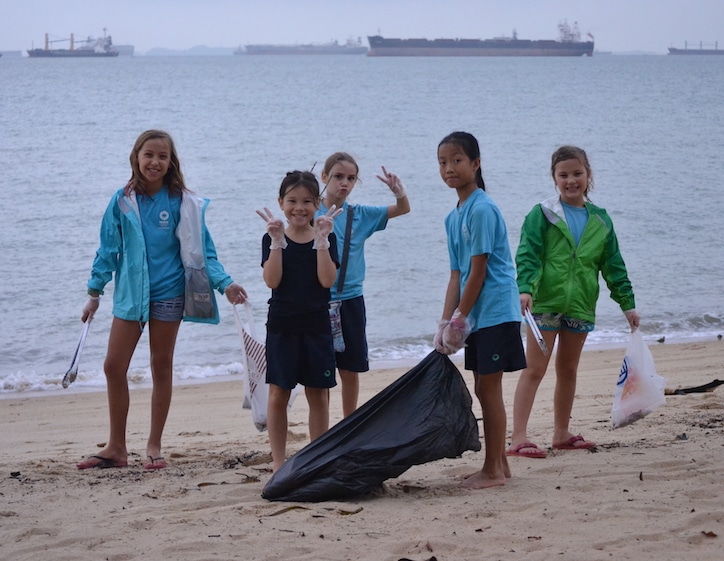

Nexus International School
Curriculum: The entire Nexus community is dedicated to a green lifestyle, though its students, led by the Environmental Rangers Club, admirably drive many of its initiatives, such as having recycling bins across the school, a “Say No to Straws” campaign, and a collaboration with the catering staff to remove plastic bottles and cutlery, along with takeaway food packaging, from dining halls. Many students bring in their own reusable straws and cutlery for meals!
Reusables and recyclables figure prominently into art and design projects; the Primary school’s Art Splash 2017 was a recent art installation that used recycled plastic bottles to highlight the magnitude of plastic consumption. Nexus even has an ECO director student responsible for ensuring that lights and projectors are turned off when not in use.
Upper Primary and Secondary students follow the UN Global Goal challenge to limit consumption (in fact Nexus holds an annual UN Global Goals week to celebrate overall environmental awareness). Year 10 students are also currently working on the UN’s “Mission Possible” Project to reduce energy consumption within the school. Sustainability is also a major focus of the Secondary School’s Young Entrepreneur programme.
Parental Involvement: Parents collaborated with students on the aforementioned Art Splash installation (families regularly contribute to drives for recyclable materials), and also make pledges to support the aims of UN Global Goals week. Furthermore, many families participate in the annual Nexus Beach Clean Up, in which the school works with NParks to clear a section of East Coast Park of litter and debris.
Nexus International School Singapore, 201 Ulu Pandan Rd, Tel: (+65) 6536 6566, www.nexus.edu.sg
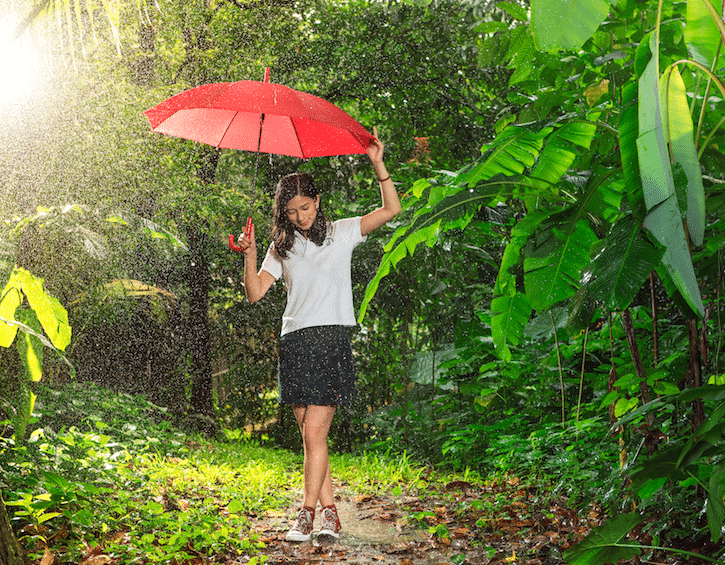

Singapore American School
Curriculum: SAS is one of the few schools in Singapore that employs a full-time Sustainability Manager, whose sole purpose is to make SAS a more sustainable and environmentally-friendly place.
The theme of sustainability is a basis for learning at every grade level at SAS. Four-year-olds in the Early Learning Center noticed that they were using disposable utensils while the older kids used metal ones. After experimenting and realizing these ‘corn plastic’ utensils hadn’t degraded at all after 6 months, they were able to switch to metal forks. Third graders – disappointed with how tough it was to recycle juiceboxes – actually lobbied TetraPak to start a recycling system on campus to properly dispose of these products. A year later they’re still making videos and leading the recycling charge at SAS.
Meanwhile, high school students can go deeper with several environmental science classes and independent projects. Students have investigated greywater recycling systems, designed rainwater collection devices, and studied insulation and air sealing to reduce cooling loads on campus.
Parental Involvement: SAS has a Zero Waste SAS task force comprised of students, parents, teachers, facilities professionals and industry experts that coordinates the school’s efforts to reduce waste. Recent initiatives include removing single-use plastic from the campus and creating a Food Waste to Food composting program.
Awards/Recognition: SAS installed a 1MW solar array and received a “solar pioneer” award from the Singapore government.
Singapore American School, 40 Woodlands Street 41, Singapore 738547, [email protected], Tel: (+65) 6363 3403, www.sas.edu.sg
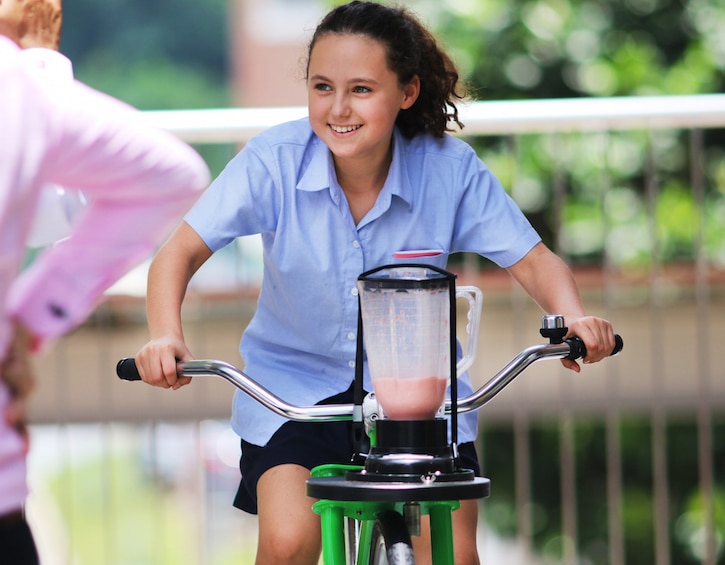

Curriculum: Tanglin is truly at the forefront of the green movement: plastic water bottles aren’t sold in school canteens, nor are they available at school events. The school shop now charges for plastic bags, while disposable plates and cutlery are no longer available in the Senior School canteen.
Meanwhile, the school is the first in Singapore to utilise En-trak™ Energy, a software platform that monitors campus-wide energy usage. By identifying trends and patterns of usage across the school’s buildings, TTS students can explore actual realtime data to better understand the consequences of their behaviour. This initiative also goes hand in hand with the school’s recent installation of solar panels of the west wing of the campus.
Green Living is suffused through every level of learning: in the Infant School, ‘Planet Protectors’ remind little ones to turn off lights, recycle materials, and look after the environment, while special celebrations like Earth Hour week and Global Guardian Day also bring environmental issues to the forefront.
The Junior ‘Green Team’ actively monitors energy use and reminds the whole school about environmental responsibility, while in the Senior School various groups – including the Year 12 Eco Group, Head Team, and IB Environmental Systems and Societies students – work to promote environmental awareness and responsible energy, water and waste practices. ‘Eco Week’ in March is also an annual highlight.
Parental Involvement: Parents get involved both indirectly – as through ‘green’ messaging students bring home with them – and directly, whether through environmentally-themed performances or special film screenings. A screening and exclusive Q+A with the director of ‘A Plastic Ocean’, for instance, became the catalyst for more plastic-reducing initiatives at Tanglin.
Awards/Honors: TTS has won the Lotus Sustained Achievement Award from the Singapore Environment Council in recognition of attaining the “Lotus” standard three years running. The Lotus Award recognizes innovative environmental projects and participation in external activities that promote Singapore’s sustainability.
Tanglin Trust School, 95 Portsdown Road, Singapore 139299, Tel: (+65) 6778 0771, www.tts.edu.sg
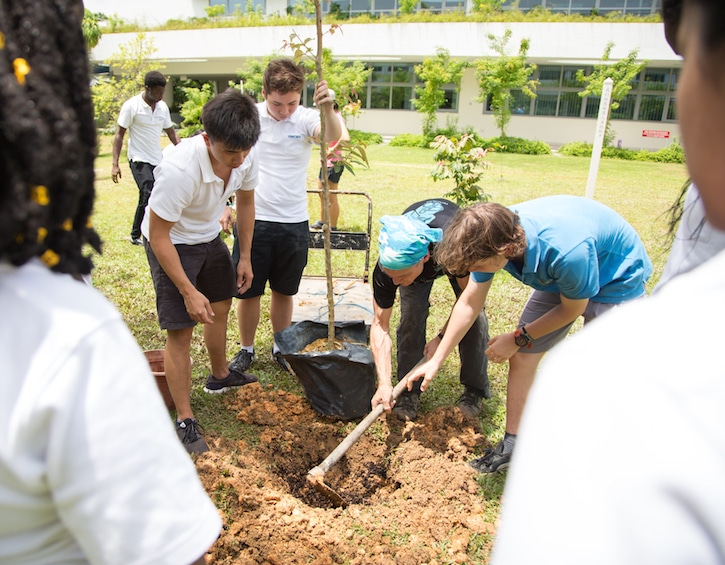

United World College South East Asia
Curriculum: Perhaps two of the greenest campuses in Singapore, UWCSEA Dover and East are both geared toward a mission of uniting people, nations and cultures for peace and a sustainable future. Sustainability is truly a core purpose and goal of the schools.
Eco-friendly classroom activities are seriously too numerous to count, but, recent initiatives have included a campus-wide food waste minimisation and composting project, the “Solar for Dover” drive to install solar panels on school buildings, an “Adopt a Tree” campaign on East Campus, and IB students researching clean water issues. Thousands of students across both campuses are active in gardening and recycling activities each week, and the school’s Rainforest Nursery group has worked alongside the Singapore National Parks Board for more than 10 years to raise awareness of rainforest endangerment.
Parental Involvement: UWCSEA parents regularly visit classrooms to share their knowledge and passion in their respective fields of expertise, and many join in on student initiatives such as gardening, tree planting, and the installation of solar panels.
Awards/Recognition: Both UWCSEA campuses have won the Singapore Building and Construction Authority (BCA)’s Greenmark Platinum Award; these numerous green features in turn help to educate students aged 4 to 18 across all parts of the curriculum.
United World College South East Asia, Dover Campus: 1207 Dover Road, Singapore 139654, [email protected], Tel: (+65) 6775 5344
East Campus: 1 Tampines Street 73, Singapore 528704, [email protected], Tel: (+65) 6305 5344
www.uwcsea.edu.sg
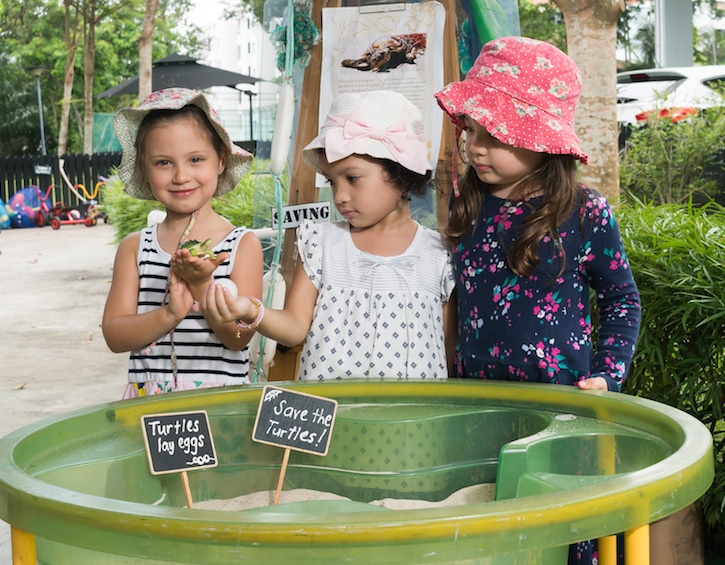

White Lodge
Curriculum: At this series of preschools, children are taught to respect each other, respect the community, and respect the world around us. Children learn to nurture the resources available to them while also eliminating wastefulness.
White Lodge’s curriculum includes a unit on recycling to introduce children to the importance of caring for the environment. They recently made their very own pirate ship out of a discarded box and went on an imaginary sea adventure! Furthermore, every White Lodge school has its own communal garden with veggies planted for sustainable meal consumption.
Earth Day is regularly celebrated at White Lodge; this past year students had a fashion parade to showcase their creative outfits made from recycled materials. In a fun twist, they also held races to see who could sort recyclable materials fastest, made musical instruments out of recyclables, and constructed “earth collages” with twigs and seeds they’d collected outside.
Parental Involvement: White Lodge asks families to bring in items like cardboard boxes, plastic bottles, and newspapers so they can be reused for arts and crafts activities. There are recycle bins at every White Lodge School, and they’ve even done a “solar cookout” following a visit to the famous Green School in Bali.
Awards/Honors: White Lodge recently joined a few other schools in a collaboration with Erub Arts, an indigenous art centre in Australia, to participate in the “Tiny Turtles” project at the Asian Civilisations Museum – the perfect follow-up to learning about sea creatures in school. The Prime Ministers of both Singapore and Australia attended the opening exhibition!
Click here to see all locations!
[email protected], Tel: (+65) 6255 4230, www.whitelodge.edu.sg





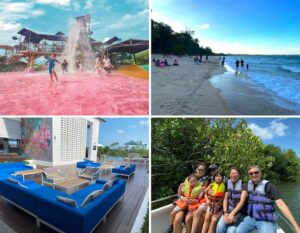
 View All
View All



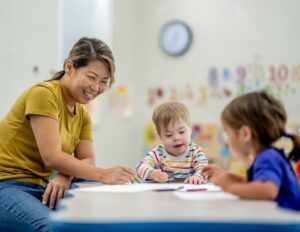
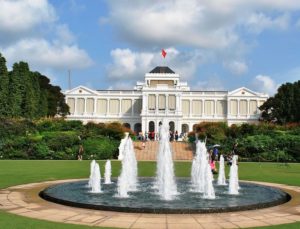
 View All
View All

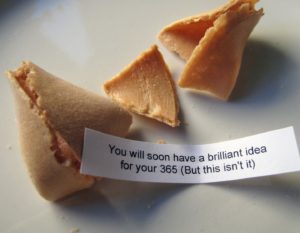
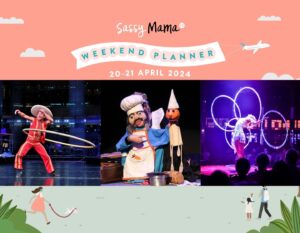
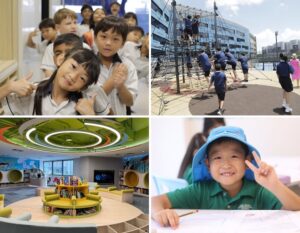
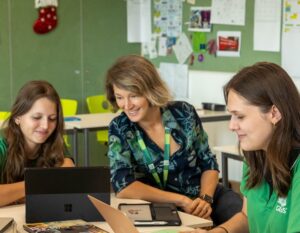


 View All
View All